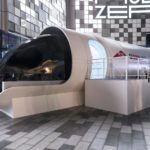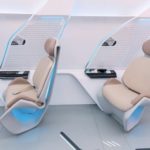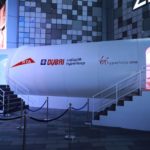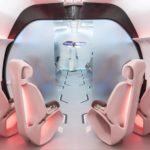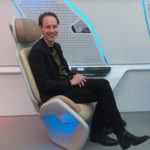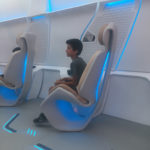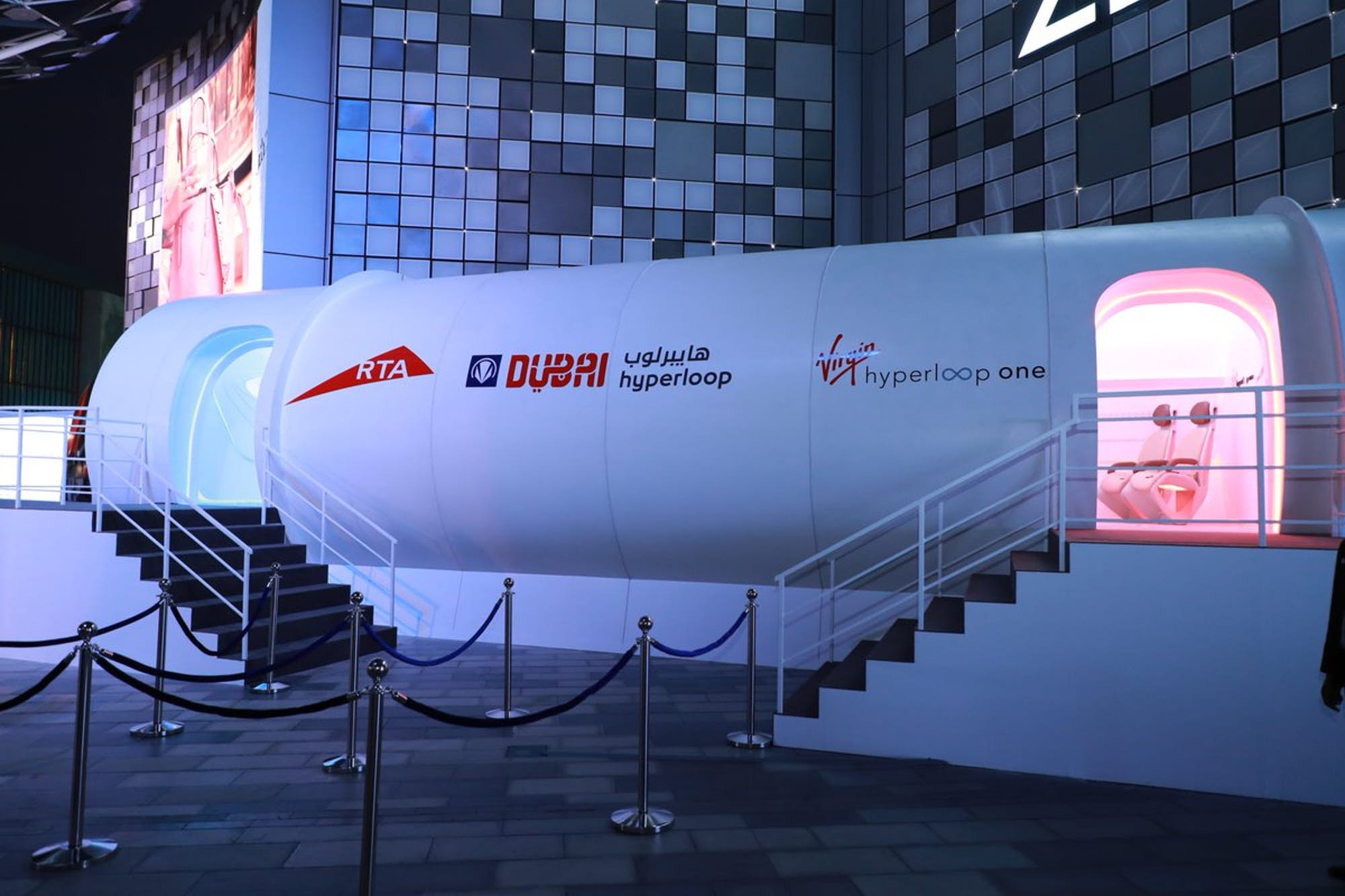
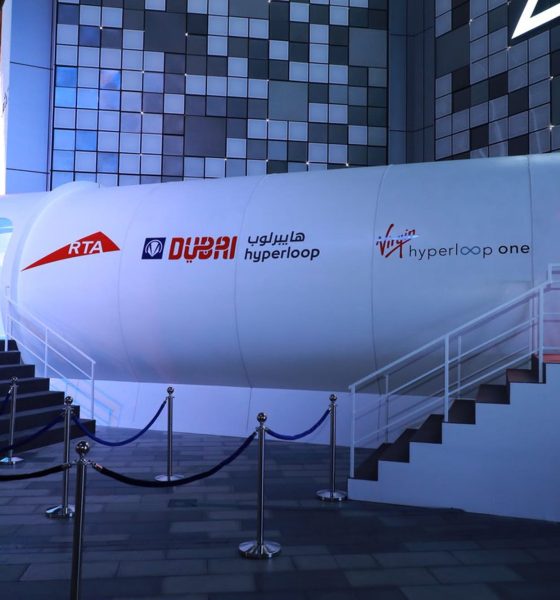
Lifestyle
Virgin Hyperloop One debuts full-scale passenger pod designed by BMW
A full-scale prototype model of a Hyperloop One passenger pod was unveiled in Dubai’s City Walk Mall, showcasing the amenities and design of the next-generation, high-speed transport system.
The 8.7-meter-long, 3.3-meter-diameter prototype, which represents a 1:1 model of the Hyperloop One passenger pod, came to fruition from the efforts of the Virgin Hyperloop One team and Dubai’s Road Transport Authority. The exhibit on the Middle Eastern mall was opened to the public, though its first visitor was Sheikh Hamdan bin Mohammed bin Rashid Al Maktoum, Dubai’s Crown Prince.
The Virgin Hyperloop One full-scale model displayed in Dubai was designed with luxury in mind. In an interview with Khaleej Times, Abdulredha Abu Alhassan, executive director of the Rail Planning and Projects Development at the RTA, described the plush amenities that were showcased in the prototype pod.
According to the RTA executive, the cream and beige seats of the Hyperloop One model were designed by German car firm BMW. While Abu Alhassan did state that passengers would have to be buckled in at all times due to the Hyperloop One’s speed, passengers could look forward to an enjoyable experience due to the pod’s interactive entertainment system.
“There will be no windows. However, there will be interactive entertainment screens at the armrest of the seats. The seats have been designed in a very futuristic manner,” the executive said.
The interior of the pod was also incredibly futuristic with its blue and red neon lights, invoking an almost Tron-like atmosphere. From the images of the pod’s interior, it appears like Dubai’s Hyperloop system would be a comfortable ride as well, as evidenced by the generous amount of legroom shown in the full-scale prototype model.
In a statement to Dezeen, Dutch designer Daan Roosegaarde expressed his optimism about the coming of the next-generation transport system. Roosegaarde was also particularly impressed by the Virgin Hyperloop One’s interior design.
“It’s a great design, really like a bubble of material and light. I can’t wait to use it to travel in 12 minutes to Abu Dhabi soon,” the Dutch designer said.
Dubai’s Hyperloop system is expected to debut as early as 2020, where it is expected to provide a faster alternative for commuters who travel between key areas in the region. With Hyperloop technology, traveling from Dubai to Abu Dhabi, which usually takes 90 minutes by car, would be possible in 12 minutes.
#Dubai Crown Prince unveils the initial design of the @HyperloopOne's
pod in the presence of Virgin Hyperloop One CEO Rob Lloyd. pic.twitter.com/Q3WD63WzOv— Dubai Media Office (@DXBMediaOffice) February 22, 2018
As we noted in a previous report, Dubai has proven to be a supporter of the Hyperloop concept. The next-generation transportation system, which was initially conceived by Tesla and SpaceX CEO Elon Musk, utilizes a linear electric motor to accelerate and decelerate an electromagnetically levitated pod through a low-pressure tube. This design enables the Hyperloop pods to achieve speeds of up to 700 mph without any turbulence, allowing passengers to enjoy a comfortable ride. A successful test for the Hyperloop was accomplished by the Virgin team back in August 2017 in Nevada, where a pod traveled roughly 500 meters and reached speeds of 190 mph.

Lifestyle
Tesla Model S Plaid battles China’s 1500 hp monster Nurburgring monster, with surprising results
There is just something about Tesla’s tuning and refinement that makes raw specs seem not as game-changing.
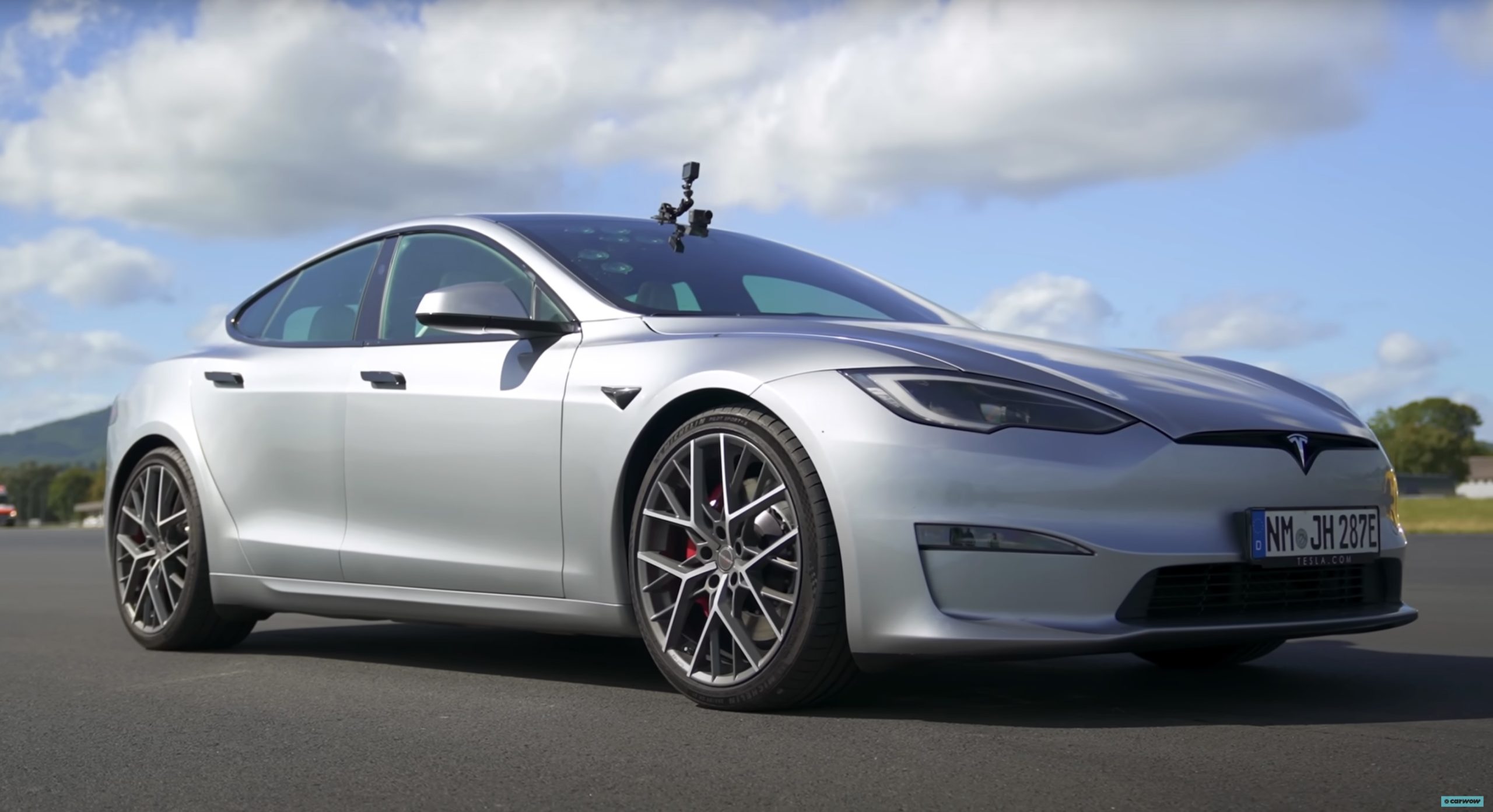
The Tesla Model S Plaid has been around for some time. Today, it is no longer the world’s quickest four-door electric sedan, nor is it the most powerful. As per a recent video from motoring YouTube channel Carwow, however, it seems like the Model S Plaid is still more than a match for some of its newer and more powerful rivals.
The monster from China
The Xiaomi SU7 Ultra is nothing short of a monster. Just like the Model S Plaid, it features three motors. It also has 1,548 hp and 1,770 Nm of torque. It’s All Wheel Drive and weighs a hefty 2,360 kg. The vehicle, which costs just about the equivalent of £55,000, has been recorded setting an insane 7:04.957 at the Nurburgring, surpassing the previous record held by the Porsche Taycan Turbo GT.
For all intents and purposes, the Model S Plaid looked outgunned in Carwow’s test. The Model S Plaid is no slouch with its three motors that produce 1,020 hp and 1,420 Nm of torque. It’s also a bit lighter at 2,190 kg despite its larger size. However, as the Carwow host pointed out, the Model S Plaid holds a 7:25.231 record in the Nurburgring. Compared to the Xiaomi SU7 Ultra’s record, the Model S Plaid’s lap time is notably slower.
Real-world tests
As could be seen in Carwow’s drag races, however, Tesla’s tech wizardry with the Model S Plaid is still hard to beat. The two vehicles competed in nine races, and the older Model S Plaid actually beat its newer, more powerful counterpart from China several times. At one point in the race, the Xiaomi SU7 Ultra hit its power limit due to its battery’s temperature, but the Model S Plaid was still going strong.
The Model S Plaid was first teased five years ago, in September 2020 during Tesla’s Battery Day. Since then, cars like the Lucid Air Sapphire and the Xiaomi SU7 Ultra have been released, surpassing its specs. But just like the Model Y ended up being the better all-rounder compared to the BYD Sealion 7 and the MG IM6, there is just something about Tesla’s tuning and refinement that makes raw specs seem not as game-changing.
Check out Carwow’s Model S Plaid vs Xiaomi SU7 drag race video below.
Lifestyle
500-mile test proves why Tesla Model Y still humiliates rivals in Europe
On paper, the BYD Sealion 7 and MG IM6 promised standout capabilities against the Model Y.
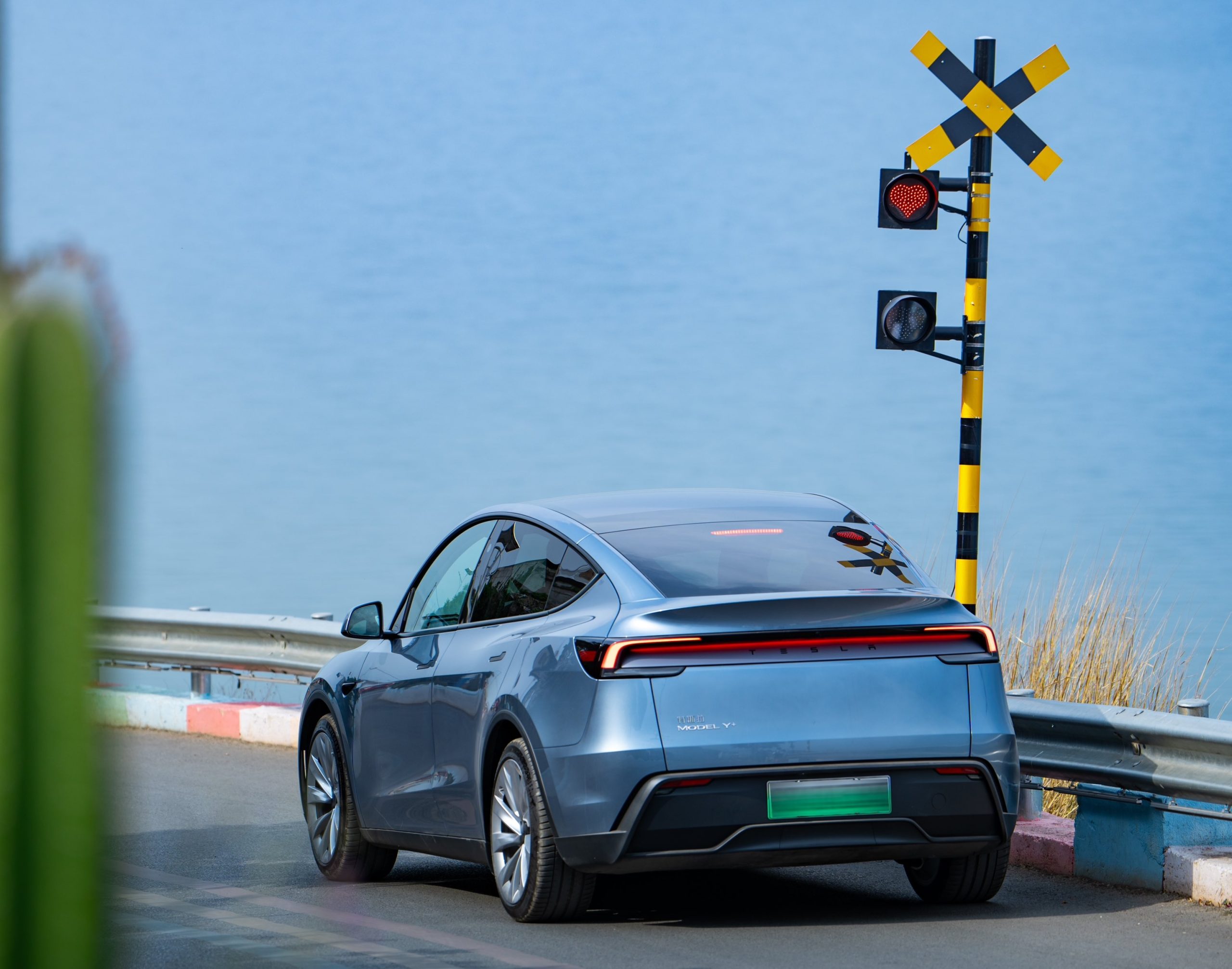
BYD is seeing a lot of momentum in Europe, so much so that mainstream media has taken every opportunity to argue that the Chinese automaker has beaten Tesla in the region. But while BYD sales this year in Europe are rising and Tesla’s registrations remain challenged, the raw capabilities of vehicles like the Model Y are difficult to deny.
This was highlighted in a 500-mile challenge by What Car? magazine, which showed that the new Tesla Model Y is more efficient, cheaper to run, and more reliable than rivals like the BYD Sealion 7, and even the nearly 400 KW-charging MG IM6.
Range and charging promises
On paper, the BYD Sealion 7 and MG IM6 promised standout capabilities against the Model Y. The Sealion 7 had more estimated range and the IM6 promised significantly faster charging. When faced with real-world conditions, however, it was still the Model Y that proved superior.
During the 500-mile test, the BYD nearly failed to reach a charging stop, arriving with less range than its display projected, as noted in a CarUp report. MG fared better, but its charging speeds never reached its promised nearly-400 kW charging speed. Tesla’s Model Y, by comparison, managed energy calculations precisely and arrived at each stop without issue.
Tesla leads in areas that matter
Charging times from 25% to 80% showed that the MG was the fastest at 17 minutes, while Tesla and BYD were close at 28 and 29 minutes, respectively. Overall efficiency and cost told a different story, however. The Model Y consumed 19.4 kWh per 100 km, compared to 22.2 for MG and 23.9 for BYD. Over the full trip, Tesla’s charging costs totaled just £82 thanks to its supercharger network, far below BYD’s £130 and MG’s £119.
What Car? Magazine’s testers concluded that despite BYD’s rapid sales growth and the MG IM6’s seriously impressive charging speeds, Tesla remains the more compelling real-world choice. The Model Y just offers stability, efficiency, and a proven charging infrastructure through its Supercharging network. And as per the magazine’s hosts, the Model Y is even the cheapest car to own among the three that were tested.
Watch What Car? Magazine’s 500-mile test in the video below.
Lifestyle
Tesla Cybertruck slapped with world’s least intimidating ticket, and it’s pure cringe
One cannot help but cringe and feel second-hand embarrassment at the idea of a person just driving around with a stack of these babies.
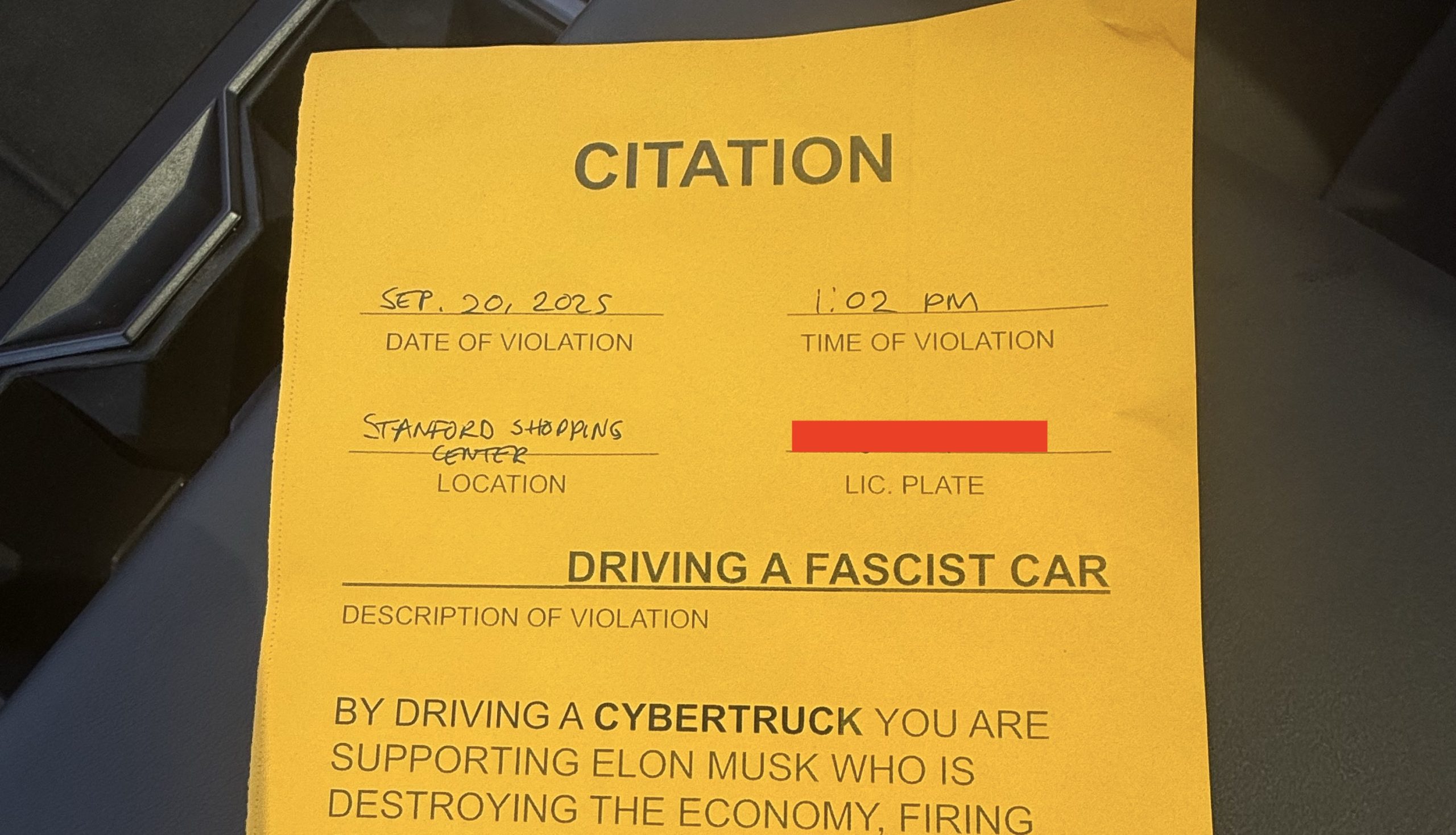
A Cybertruck parked at Stanford Shopping Center in California was recently hit with what might be the most try-hard piece of paper ever slipped under a wiper blade: a “fake citation” accusing the driver of supporting a “fascist car.”
The note, shared on X by Tesla staff program manager Ryan Torres, quickly made the rounds on X, where it quickly gained attention as an example of how not to protest.
The world’s least intimidating ticket
According to the citation, the supposed “violation” was “driving a fascist car.” The remedial action? Take the bus, call an Uber, or ride a bike. The note also dubbed Elon Musk a “chainsaw-wielding Nazi billionaire.” Now, protests against Tesla and Elon Musk have become commonplace this year, but one cannot help but cringe and feel second-hand embarrassment at the idea of a person just driving around with a stack of fake anti-Tesla/Musk citations.
Torres pointed out the irony himself in his post on X. Tesla currently employs over 140,000 Americans, and SpaceX has put the U.S. firmly back at the top of space technology. As Torres put it, maybe the person behind the world’s least intimidating ticket should “read a book on innovation before vandalizing” other people’s property.
Peak performative clownery
Not to mention that the fake ticket’s logic collapses under its own weight. EVs like the Cybertruck are literally designed to reduce emissions, not “destroy the economy.” If anything, Tesla has bolstered the United States’ economy by fueling jobs in engineering, manufacturing, and clean energy. It’s not the first time a Tesla has been the target of vandalism or politically charged notes, but this one stands out for sheer cringe value.
Torres summed it up neatly: “Peak clownery.” On that point, at least, the citation earns full marks. In a way, though, perhaps cringe fake tickets are not as bad as the literal firebombs that were being thrown at Tesla stores and cars earlier this year because some critics were gleefully misinformed about Elon Musk.
